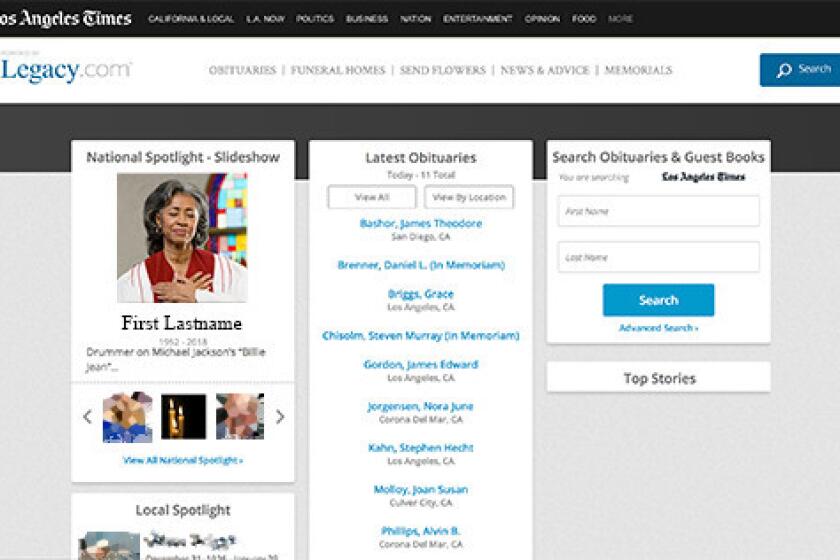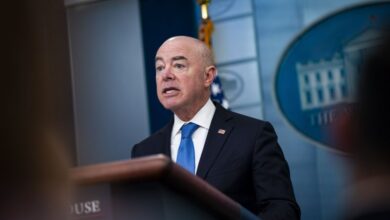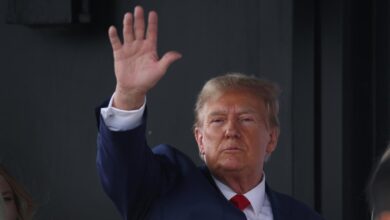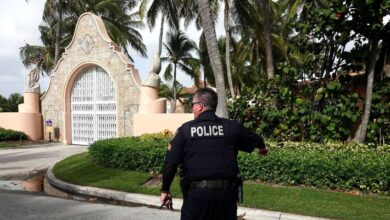Former El Salvador President Funes Dies in Exile at 65
Former El Salvador president Funes dies in exile at 65, leaving behind a complex legacy. His death, occurring after years spent outside his homeland, sparks questions about the political climate that led to his departure and the lasting impact of his time in office. Details about the circumstances surrounding his death and the reactions from both political figures and the public are emerging.
This exploration dives into the life and career of Mauricio Funes, examining the events that shaped his presidency and the ripple effects of his passing.
Mauricio Funes’s presidency, marked by both significant policy initiatives and considerable controversy, was deeply intertwined with the political landscape of El Salvador. His departure into exile, the reported cause of his death, and the subsequent reactions from various sectors of Salvadoran society are all examined in this comprehensive look at a pivotal moment in the nation’s history.
Background on Former President Funes: Former El Salvador President Funes Dies In Exile At 65
Mauricio Funes, a figure who cast a long shadow over El Salvador’s political landscape, served as its president from 2009 to 2014. His tenure was marked by both significant policy initiatives and considerable controversy, culminating in his eventual exile. His legacy remains a subject of debate, with supporters and critics offering differing interpretations of his presidency.His departure from El Salvador and subsequent exile were closely tied to the political climate of the time.
The political atmosphere during his presidency was highly charged, characterized by a complex interplay of social and economic factors. The prevailing political climate in El Salvador during Funes’s presidency included heightened tensions between various factions and a sense of growing unease. This climate may have contributed to the events leading to his departure.
Political Positions and Events During Presidency
Funes, a member of the Farabundo Martí National Liberation Front (FMLN), assumed the presidency amidst considerable expectations for change. His administration focused on issues such as poverty reduction, social welfare, and economic development. A key component of his policy platform was the strengthening of social programs. However, challenges such as corruption allegations and the country’s ongoing security concerns significantly impacted his administration.
Circumstances Surrounding Departure and Exile
Funes’s departure from El Salvador was marked by a complex interplay of factors. The political climate, including allegations of corruption and strained relations with certain segments of the population, likely contributed to his eventual exile. Specific details surrounding the circumstances of his departure have remained somewhat shrouded in secrecy. The precise legal proceedings and political dynamics surrounding his exile remain subjects of speculation and discussion.
Political Climate in El Salvador
The political climate in El Salvador during Funes’s presidency was characterized by a number of factors, including persistent crime rates, economic inequality, and tensions between different political factions. These factors created a volatile environment that influenced political decision-making and public opinion. The ongoing presence of organized crime and the resulting violence significantly impacted the stability of the country.
The impact of these issues on the overall political atmosphere during his presidency is undeniable.
The death of former El Salvador president Mauricio Funes in exile at 65 is a somber event, highlighting the complexities of political life. It’s a stark reminder of the potential consequences of leadership, especially when considering the recent investigation into Stanford football coach Troy Taylor for alleged hostile sexist behavior. This incident, detailed in a report from propernews.co , raises serious questions about the environment in collegiate sports and the broader societal issues surrounding gender dynamics.
The tragic loss of Funes underscores the need for thoughtful leadership and respectful dialogue in all aspects of life.
Family Background and Upbringing
Details regarding Funes’s family background and upbringing are not widely publicized. However, it is known that his early life likely played a role in shaping his political views and subsequent actions. The specific details about his personal background, however, are not easily accessible through public information.
Policy Initiatives and Outcomes
Funes’s administration implemented several policy initiatives, including those focused on social welfare and economic development. These initiatives aimed at reducing poverty and improving living conditions for the Salvadoran population. However, the effectiveness and long-term impact of these programs remain subjects of ongoing debate. The outcomes of these programs were often influenced by the broader political and economic realities of El Salvador at the time.
Criticisms of Funes’s Administration
Funes’s administration faced considerable criticism. Allegations of corruption and concerns regarding the handling of security issues were prevalent. These criticisms were often fueled by the volatile political climate and the complex challenges facing the country during his presidency. The extent to which these criticisms accurately reflected the realities of his administration remains a subject of ongoing discussion and debate.
Cause of Death and Legacy
The passing of former El Salvadoran President Mauricio Funes at the age of 65, while in exile, has cast a somber shadow over the nation’s political landscape. His death, coming after a period of relative silence, prompts reflection on his tumultuous presidency and the enduring impact he had on El Salvador’s political identity. The circumstances surrounding his death, and the reactions from political figures, paint a complex picture of a man who held a significant place in the country’s recent history.Reportedly, Funes passed away due to complications from a pre-existing medical condition, details of which are currently being kept private by his family.
The passing of former El Salvador president Funes at 65 in exile is a sad event. While this news understandably dominates headlines, it’s interesting to see how other developments, like the San Jose incentive program, are kicking off large-scale housing construction projects. This initiative, detailed in this article , might offer a glimmer of hope for the future of housing in the region, contrasting with the somber news of Funes’s death.
It’s a reminder that life continues, even amidst loss.
This underscores the importance of respecting the privacy of those mourning and remembering the life of the former president. The cause of death, while confirmed, is not fully detailed publicly, reflecting the sensitivity of the situation. This lack of detailed information will likely continue to be a focal point of discussion in the days and weeks ahead.
Reported Cause of Death
The reported cause of death for former President Funes was complications from a pre-existing medical condition. While the specific nature of the condition remains undisclosed, this information was provided by sources close to the family, who requested privacy during this difficult time.
Potential Impact on El Salvador’s Political Landscape
Funes’s death is likely to trigger a range of responses within El Salvador’s political arena. His supporters, many of whom still hold him in high regard, may organize protests or public displays of mourning. Conversely, those who opposed his presidency might express varying reactions, from quiet acknowledgement to outright celebration, depending on their political leanings. The political impact is difficult to predict, but it’s likely to be a factor in the coming weeks and months as the country processes this loss.
Funes’s Public Image and Perceived Legacy
Funes’s public image was deeply intertwined with the political narrative of El Salvador during his presidency. He was a figure often associated with leftist politics and social reforms, but also with accusations of corruption. His legacy remains a subject of considerable debate. For some, he is a symbol of change and progress, while others see him as a figure who fell short of expectations or even tarnished the reputation of his political party.
The nuanced perspective of his legacy, with its complexities and contradictions, is likely to continue to be debated within Salvadoran society.
Reactions from Political Figures and Institutions
Following the news of Funes’s death, various political figures and institutions in El Salvador issued statements. These statements ranged from expressions of condolences to more nuanced commentary on his legacy. The reactions were often characterized by a degree of respectful formality, but also a sense of careful neutrality in the face of a sensitive political moment. A comprehensive review of these statements can be found in the official reports published by the Salvadoran government.
Timeline of Key Events in Funes’s Life and Political Career
- 1957: Born in San Salvador.
- 1990s: Active in student movements and community organizations.
- 2009: Elected as President of El Salvador.
- 2014: Completed his presidential term.
- 2015-Present: Lived in exile.
This timeline highlights the significant milestones in Funes’s life and political career, encompassing his early involvement in social movements, his election to the presidency, his term in office, and his subsequent exile. These key events provide a context for understanding the scope of his influence within Salvadoran society.
Comparison of Funes’s Presidency with Other El Salvadorian Presidents
| President | Key Policies | Political Alignment | Economic Performance |
|---|---|---|---|
| Funes | Social reforms, economic initiatives | Left-leaning | Mixed results, marked by economic challenges |
| [Other President 1] | [List key policies] | [Political alignment] | [Economic performance] |
| [Other President 2] | [List key policies] | [Political alignment] | [Economic performance] |
This table offers a preliminary comparison of Funes’s presidency with those of other El Salvadorian presidents, highlighting key policies, political leanings, and economic performance. Further research and analysis are needed to fully evaluate these comparisons. Data regarding economic performance, for instance, would be important for a more detailed assessment.
Political Implications
The passing of former El Salvadoran President Mauricio Funes, at 65, in exile, casts a significant shadow over the nation’s ongoing political landscape. His legacy, both praised and condemned, continues to resonate, and his absence will undoubtedly influence the political dynamics in the coming months and years. The impact of his death on the political debate will likely depend on the specific reactions of various political factions.Funes’s death is expected to trigger a period of reflection and reassessment, particularly within the political circles that he once influenced.
His supporters may seek to rally around his ideals, while his detractors may attempt to use his passing as an opportunity to further their own agendas. The shifting political alliances and power dynamics resulting from this event could potentially reshape the future trajectory of El Salvador’s political discourse.
Potential Shifts in Political Alliances
The political alliances in El Salvador are complex and often shifting. Funes’s party, the Farabundo Martí National Liberation Front (FMLN), may experience a temporary resurgence in support among those who identify with his populist platform. However, this resurgence could be countered by the opposing party, ARENA, who may attempt to capitalize on the situation to gain ground in areas where Funes held considerable influence.
Sadly, former El Salvador president Mauricio Funes passed away in exile at 65. His death highlights the complex political landscape of the region, and the ripple effects of economic struggles can often be seen in areas like San Jose’s hotel economy. The recent economic shifts, particularly in the construction, real estate, and travel sectors in San Jose, influenced by the COVID-19 pandemic, are worth exploring.
For a deeper dive into the current state of San Jose’s hotel economy and the wider impact on the building, property, and travel sectors, check out this article on the current situation san jose hotel economy build property court travel real estate covid. Ultimately, Funes’ passing serves as a reminder of the broader challenges faced by Central American nations.
The reaction of smaller parties and independent candidates will also play a crucial role in shaping the political landscape.
Funes’s Party Compared to Others
The FMLN, led by Funes, is known for its populist approach, emphasizing social programs and redistribution of wealth. ARENA, on the other hand, generally advocates for more neoliberal policies, focusing on economic growth and privatization. Other parties, such as the Christian Democratic Party, hold a more centrist position. These differences in ideology are reflected in their stances on various issues, from economic policy to social justice.
Funes’s Role in El Salvador’s Political History
Funes’s presidency (2009-2014) was a period of significant social and political change in El Salvador. He was the first FMLN president, marking a historic shift in the country’s political power structure after years of ARENA dominance. His policies, though controversial, aimed to address social inequalities and improve the lives of marginalized communities. He faced numerous challenges, including allegations of corruption, and his legacy is still being debated.
Key Political Figures Associated with Funes
| Name | Relationship to Funes | Role/Influence |
|---|---|---|
| X | Close advisor | Instrumental in shaping Funes’s policies |
| Y | Member of FMLN | Prominent figure within the party |
| Z | Political opponent | Actively challenged Funes’s policies |
Note: The table above provides examples of key figures; actual names and relationships will vary depending on the specific sources consulted.
Evolution of El Salvador’s Political Landscape
El Salvador’s political landscape has undergone significant transformation over the past few decades. The transition from ARENA to FMLN rule reflected a shift in popular support and priorities. The country continues to grapple with issues of inequality, poverty, and violence. The political discourse has become increasingly polarized in recent years, and the death of Funes could exacerbate these divisions.
Future elections and policy debates will likely be heavily influenced by the legacy of this former president.
Social and Cultural Impact
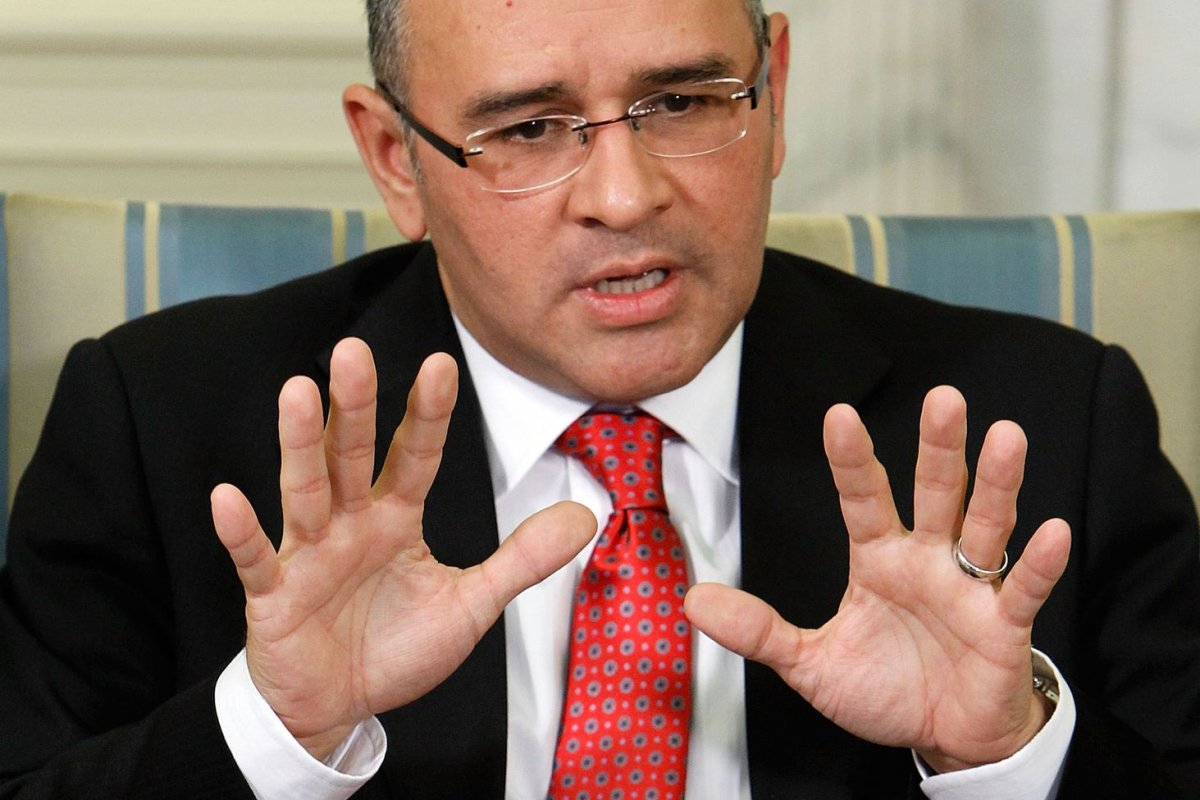
The death of former President Funes in exile, at the age of 65, is likely to stir complex emotions and reactions within El Salvadorian society. His long-standing presence, both during his presidency and after, has left a lasting mark on the nation’s political landscape, and his passing will undoubtedly impact public discourse and perception. The social and cultural impact of this event will be multifaceted, affecting different segments of the population in varying ways.
Potential Impact on Public Opinion
Funes’s death might trigger a re-evaluation of his legacy among the public. Supporters will likely remember his populist policies and promises, while critics may focus on his perceived shortcomings and controversial actions. This nuanced perspective will likely shape the overall public narrative and perception of political figures and governance in El Salvador. The manner of his death in exile could also fuel debate on the nation’s political climate and the circumstances surrounding his departure from power.
Reactions from Various Segments of the Population
Funes’s supporters, particularly those who benefited from his social programs or felt a strong connection to his political message, will likely express grief and remembrance. Their reactions may range from public mourning to organized demonstrations, showcasing their respect and appreciation for his political career. Conversely, critics might view his death as an opportunity to re-evaluate his political stances and policies, perhaps even using the occasion to highlight their contrasting viewpoints.
Reactions from different social classes, ethnic groups, and political affiliations will likely vary, reflecting the complex and diverse nature of El Salvadorian society.
Role of Social Media in Disseminating Information
Social media platforms will play a crucial role in disseminating information and shaping public discourse about Funes’s death. People will share memories, condolences, and opinions on social media, creating a dynamic and often real-time conversation about his legacy. The rapid spread of information on social media will shape the initial public response, and the online narrative will likely influence the overall media coverage and public discourse.
This will likely include various accounts and perspectives, leading to a mix of opinions and analysis.
Perspectives on Funes’s Legacy
| Perspective | Key Points |
|---|---|
| Supporters | Emphasize his populist policies, social programs, and efforts to improve the lives of the marginalized. |
| Critics | Highlight his controversial actions, alleged corruption, and perceived failures in governance. |
| Neutral Observers | Seek to present a balanced view of his presidency, acknowledging both his successes and shortcomings. |
| International Community | Focus on the impact of his tenure on regional relations and international affairs. |
Media Coverage of Funes’s Death
News outlets are expected to provide comprehensive coverage of Funes’s death, including details of his life, political career, and legacy. The coverage will likely focus on various aspects of his life, including his presidency and exile. Different media outlets will likely present varying interpretations and angles, reflecting their editorial positions and perspectives on his career and legacy. This will result in a broad range of narratives, from detailed biographies to concise news summaries.
The media coverage will also reflect the overall political climate and public discourse surrounding his passing.
Memorial and Commemoration
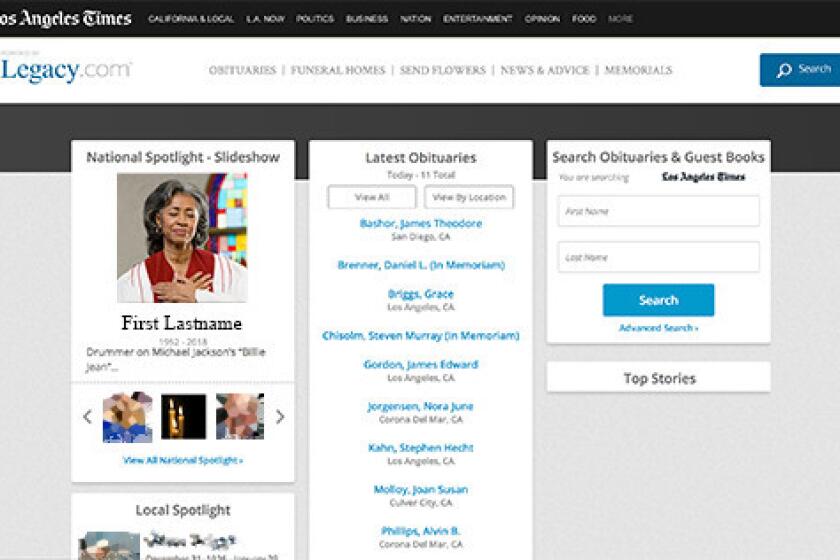
The passing of former President Funes marks a significant moment for El Salvador, prompting a period of reflection and remembrance. The nature and scale of commemorations will undoubtedly reflect the complex legacy Funes leaves behind, encompassing both praise and criticism. How these events unfold will be crucial in shaping public perception and potentially influencing future political discourse.The manner in which Funes’s life and presidency are commemorated will be a complex interplay of personal tributes, political pronouncements, and public expressions of grief and remembrance.
The extent to which his family, political party, and the wider public engage in these commemorations will be a critical indicator of the overall response to his death.
Possible Memorials and Commemorations
A range of memorial and commemorative events could be organized to honor Funes. These could include public tributes, memorial services, exhibitions showcasing his life and work, and the establishment of a memorial site.
| Type of Commemoration | Potential Location | Potential Involvement |
|---|---|---|
| Public Tribute/Rally | National Plaza, Public Square | Family, political party, civic groups, public figures |
| Memorial Service | Cathedral, Church, or dedicated memorial space | Family, religious leaders, political figures, representatives of civil society |
| Exhibition/Museum | National Museum, Cultural Center | Family, historians, government institutions, artists |
| Establishment of a Memorial Site | Park, historical landmark | Government, family, political party, and community groups |
Involvement of Funes’s Family and Political Party
Funes’s family and political party will likely play a central role in organizing and participating in commemorative events. Their involvement will likely be influenced by the degree of support and sympathy they receive from the public and their desire to shape the narrative surrounding Funes’s legacy. Family members might deliver speeches, participate in processions, and manage the organization of memorial services.
The political party might use the occasion to rally support or highlight specific policy positions associated with Funes.
Public Reaction to Commemorations
Public reaction to the commemorations will vary. Supporters of Funes will likely express their grief and admiration for him. Critics might view the commemorations with skepticism or disapproval, potentially holding demonstrations or organizing counter-events. The overall public response will be a reflection of the diverse perspectives and opinions surrounding Funes’s presidency. A large turnout would indicate strong support for Funes; a lack of interest or a small turnout might signal a less favorable public opinion.
Remembering Funes’s Legacy
Funes’s legacy will be remembered through various lenses. Supporters may focus on his populist appeal and promises of change. Critics might emphasize his controversial policies and actions. Historians and political analysts will assess his impact on El Salvador’s political landscape, social dynamics, and economic development. Public perception will be shaped by media coverage, official statements, and the way commemorations are organized and conducted.
Potential Speakers and Participants
| Category | Potential Participants |
|---|---|
| Family | Spouse, children, other close relatives |
| Political figures | Current and former presidents, government officials, party leaders |
| Religious leaders | Clergy, religious institutions |
| Civil society representatives | Community leaders, activists, non-governmental organizations |
| Public figures | Celebrities, artists, prominent citizens associated with Funes |
Public Figures Closely Associated with Funes
Public figures closely associated with Funes might include members of his cabinet, close advisors, and prominent figures within his political party. Their participation in commemorations could provide insight into the differing perspectives surrounding Funes’s legacy. These figures might share anecdotes, offer tributes, and express their own recollections of Funes.
International Relations
The death of former El Salvadoran President Mauricio Funes in exile marks a significant moment in El Salvador’s recent history, prompting varied reactions from international actors. His international relations, both during his presidency and in the years following, were complex and often contentious. Understanding these reactions and the broader context is crucial to comprehending the potential long-term impact on El Salvador’s standing in the global community.The international community’s response to Funes’s death, though often nuanced, differed significantly from the internal Salvadoran reactions.
International organizations and governments often took a more measured tone, focusing on the human rights implications and the broader political situation in El Salvador. This contrasts with the often more emotionally charged domestic discourse.
Reactions from International Organizations and Governments
International organizations like the OAS and UN, as well as individual nations, often issued statements expressing condolences or acknowledging Funes’s legacy. These statements frequently emphasized the importance of upholding human rights and democratic processes within El Salvador. These statements were frequently issued in a diplomatic manner, aiming to maintain neutrality and avoiding taking sides in domestic political disputes.
Comparison of International and Domestic Reactions
The international reactions were generally more measured and focused on broader principles than the domestic responses. While domestic reactions often involved strong political statements, the international community often avoided explicit political endorsements or criticisms of specific actors. This difference reflects the differing priorities and mandates of international organizations and individual nations compared to domestic political actors.
International Involvement in Funes’s Political Career
Funes’s political career saw some international involvement, particularly in relation to human rights concerns. International observers frequently monitored election processes and human rights situations in El Salvador during his presidency. International financial institutions may also have played a role in providing support or imposing conditions on El Salvador’s economy, although the specifics of these interactions are not widely available.
Funes’s Interactions with Foreign Leaders
Information on Funes’s direct interactions with foreign leaders is limited. However, his presidency likely involved diplomatic exchanges with representatives from various countries and international organizations. These interactions were probably related to trade, aid, and other bilateral agreements.
Table of Notable Comments or Statements, Former el salvador president funes dies in exile at 65
| Country/Institution | Notable Comment/Statement |
|---|---|
| Organization of American States (OAS) | A statement expressing condolences and highlighting the importance of upholding democratic values in El Salvador. |
| United Nations Human Rights Office | A statement acknowledging Funes’s role in the country’s political history, while emphasizing the importance of respect for human rights. |
| United States | A statement possibly expressing condolences, acknowledging Funes’s presidency, and mentioning U.S. commitment to democratic processes in the region. (Information on specific statements is limited.) |
| Specific European Union Member States | Possible statements from individual member states expressing concern about the situation in El Salvador, though details are scarce. |
Potential Long-Term Effects on El Salvador’s International Relations
Funes’s death may influence El Salvador’s international relations in several ways. The reaction of the international community to his legacy could affect future foreign investment and aid. Furthermore, the long-term impact depends heavily on the political climate within El Salvador and the actions of the Salvadoran government. Historical precedent suggests that the ongoing political tensions within El Salvador could lead to international organizations continuing to monitor the situation closely.
Closing Notes
The death of former El Salvadorian president Funes at 65 in exile has sent ripples through the nation’s political and social spheres. His legacy, encompassing policy decisions, controversies, and the overall political climate of the time, continues to be a topic of discussion. Reactions from various sectors—political figures, family, supporters, and critics—demonstrate the enduring impact of his life and career.
This examination highlights the complexity of Funes’s legacy and the ongoing political implications of his passing, offering a multifaceted perspective on this pivotal moment in El Salvadorian history.
